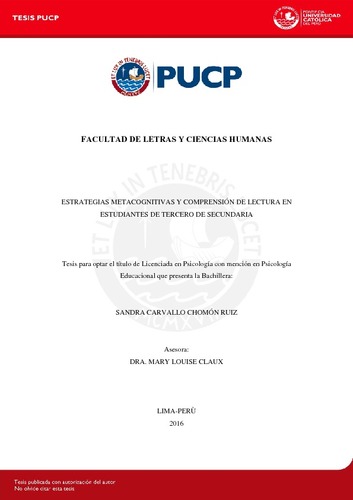| dc.contributor.advisor | Claux Alfaro, Mary Louise | es_ES |
| dc.contributor.author | Carvallo Chomón Ruiz, Sandra | es_ES |
| dc.date.accessioned | 2016-05-09T20:00:31Z | es_ES |
| dc.date.available | 2016-05-09T20:00:31Z | es_ES |
| dc.date.created | 2016 | es_ES |
| dc.date.issued | 2016-05-09 | es_ES |
| dc.identifier.uri | http://hdl.handle.net/20.500.12404/6846 | |
| dc.description.abstract | El objetivo del presente estudio fue identificar si existió relación positiva entre el uso de
estrategias metacognitivas reportado (IEML) y el rendimiento en comprensión de
lectura (compLEC). También, se planteó identificar la relación entre compLEC y IEML
con el gusto, la frecuencia de lectura, el tipo de material (digital o impreso), el lugar
donde leen los estudiantes, la frecuencia de lectura de los padres, la cantidad de libros y
recursos de lectura disponibles en casa. Además, se comparó si estos resultados diferían
según el sexo del estudiante. La muestra estuvo conformada por 197 estudiantes
escolares, 102 mujeres y 95 hombres de tercer año de secundaria de una institución
educativa pública de Lima Metropolitana. Los resultados demostraron una correlación
positiva, significativa y moderada entre compLEC y IEML (r=.27 p=.00). Además, se
encontró correlación positiva, significativa y moderada entre el compLEC y el gusto por
la lectura (r=.34, p=.00) y lectura realizada en casa (r=.30, p=.01). Asimismo, el
compLEC correlaciona directa, leve y significativamente con el número de libros en
casa (r=.21, p=.00), los recursos en casa (r=. 20, p=.00), la lectura en material impreso
(r=. 19, p=.01) y la lectura en material digital (internet) (r=. 15, p=.05). Al segmentar la
data según sexo, se evidenció que en los hombres hubo una correlación positiva, fuerte
y significativa entre compLEC y IEML (r=.38, p=.01), mas no en las mujeres (r=.16,
p=.12). Por su parte, las mujeres obtuvieron correlación positiva, fuerte y significativa
entre el compLEC y el gusto por la lectura (r=.40, p=.00), mientras que en los hombre
fue moderada (r=.27, p=.01). | es_ES |
| dc.description.abstract | The aim of this study was to identify if there was a positive relationship between the use
of metacognitive strategies reported (IEML) and performance in reading comprehension
(compLEC). Also, this research intended to identify the relationship between compLEC
and IEML with enjoyment of reading, reading frequency, type of material (digital or
printed), the place where students read, the frequency that parents read, the number of
books and reading resources available at home. Furthermore, it was compared if these
results differ by student’s sex. The sample consisted of 197 school students, 102 women
and 95 men of a public school in Lima. The results showed a positive, significant and
moderate correlation between compLEC and IEML (r = .27 p = .00). Also, it was found
positive, significant and moderate correlation between compLEC and enjoyment of
reading (r = .34, p = .00) and reading done at home (r = .30, p = .01). In addition,
compLEC correlates directly, slight and significantly with the number of books at home
(r = .21, p = .00), resources at home (r =. 20, p = .00), reading printed material (r =. 19,
p = .01) and reading digital material (internet) (r =. 15, p = .05). By segmenting the data
by sex, it was shown that in men there is a positive, strong and significant correlation
between compLEC and IEML (r = .38, p = .01), but not in women (r = .16, p = 12).
Also, women showed positive, strong and significant correlation between compLEC
and enjoyment of reading (r = .40, p = .00), while in men it was moderate (r=.27,
p=.01). | es_ES |
| dc.language.iso | spa | es_ES |
| dc.publisher | Pontificia Universidad Católica del Perú | es_ES |
| dc.rights | Atribución-NoComercial-SinDerivadas 2.5 Perú | * |
| dc.rights | info:eu-repo/semantics/openAccess | es_ES |
| dc.rights.uri | http://creativecommons.org/licenses/by-nc-nd/2.5/pe/ | * |
| dc.subject | Comprensión de lectura | es_ES |
| dc.subject | Aprendizaje cognitivo. | es_ES |
| dc.subject | Educación secundaria--Investigaciones. | es_ES |
| dc.title | Estrategias metacognitivas y comprensión de lectura en estudiantes de tercero de secundaria | es_ES |
| dc.type | info:eu-repo/semantics/bachelorThesis | es_ES |
| thesis.degree.name | Licenciado en Psicología Educacional | es_ES |
| thesis.degree.level | Título Profesional | es_ES |
| thesis.degree.grantor | Pontificia Universidad Católica del Perú. Facultad de Letras y Ciencias Humanas | es_ES |
| thesis.degree.discipline | Psicología Educacional | es_ES |
| renati.discipline | 313046 | es_ES |
| renati.level | https://purl.org/pe-repo/renati/level#tituloProfesional | es_ES |
| renati.type | http://purl.org/pe-repo/renati/type#tesis | es_ES |
| dc.publisher.country | PE | es_ES |
| dc.subject.ocde | http://purl.org/pe-repo/ocde/ford#5.01.00 | es_ES |






